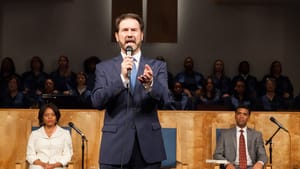Stay in the Loop
BSR publishes on a weekly schedule, with an email newsletter every Wednesday and Thursday morning. There’s no paywall, and subscribing is always free.
The power and the passion
Lucas Hnath's 'The Christians' at the Wilma Theater

George Bernard Shaw wrote eloquently about the similarities between church and theater — both are shared social experiences requiring openness to the presented material. I often preach to students that while theater and film may seem nearly identical, the church analogy is the right approach to theater: We must participate, give ourselves over to the experience instead of sitting back in judgment.
All this swam in my mind when I entered the Wilma Theater to see Lucas Hnath’s astonishing drama The Christians. Set designer Matt Saunders transforms the spacious stage into a modern evangelical temple, ethereally lit by Thom Weaver, with freshly vacuumed blue carpet, elegantly restrained blonde wood furniture, a plexiglass pulpit with microphone, and five throne-like chairs for clergy, each with a mic. Behind this stage are raised rows for the choir (20 local recruits, all in blue robes, who sound great), and a small band led by Michael G. Keck.
Fear and doubt in the pews
Theater is my church, but in my youth I attended (often against my will) many religious services, including an evangelical mega-church like this, which Hnath’s dialogue describes as having thousands of seats, plus a complex with classrooms, a coffee shop, bookstore, vast parking lot, and “a baptismal font as big as a swimming pool.” The one I visited had all that plus its own cable TV station.
I suppose many in the Wilma crowd are unlikely to enter a church like this — though some sang along to the pleasantly poppy modern hymns and answered the preacher’s calls.
The play begins with a sermon from Pastor Paul (Paul DeBoy), who makes love to the microphone with his silky voice while soothing visions of floating clouds and mountains play on two video screens flanking the pulpit. He celebrates the church’s freedom from debt after 10 long years, and then, after telling a harrowing story about a heathen boy who died saving his sister from a fire, drops the bomb: “We are no longer a congregation that believes in Hell.”
Some beliefs are sacred
Young pastor Joshua (DeLance Minefee) objects to the idea, decrying this “radical change” — though Pastor Paul refutes every vague Biblical mention of Hell that Joshua cites as proof. Suddenly, we’re witnessing a father-son struggle with the titanic scope and force of Greek tragedy. Will being told Hell doesn’t exist eliminate people's fear God’s wrath? Is that the only way Christianity inspires people to resist temptation?
Is Paul announcing this now because the church is finally out of debt?
Though the show begins as part of the church service we’ve been invited to share, tone and time shift. Paul begins narrating — “And Joshua says . . .” — as if recounting the story later. Meanwhile, Paul’s wife Elizabeth (Erika LaVonn) sits serenely silent, as suspense builds. We jump forward in time as Elder Jay (Ames Adamson), a board member responsible for fund-raising for this “massive corporation,” worries that revenues will fall as Joshua leads a significant portion of the congregation to form a new church.
Choir member Jenny (Julie Jesneck) questions Paul. She’s a poor single mom, so devoutly grateful that she tithes 20% of her income, double the standard. Since Paul’s announcement, she’s wracked with doubts. “It’s as if you have a choice about how to read it,” she complains. We chuckle, but her lifelong belief is crumbling. “If there’s no punishment, why should we be good?” she asks. “And where did Hitler go?”
“If all are saved,” Paul reasons, “then so is Hitler.” Jenny’s worldview implodes.
Worlds crumble
One might wonder if a theological discussion can be good theater. Hell, yes! Shaw knew that passion can drive ideas and make complex issues exciting. My worry about this thrilling play is that Christians will stay away, thinking it’s an affront, and non-Christians will pass, assuming that it’s an effort to preach to them. Neither is true.
The choir, Jenny, Elder Jay, and Joshua play their profound moments, then exit, leaving Paul and Elizabeth. The gulf between them is a key theme in their relationship, which began years ago when Paul passed a note via a stewardess to a plane’s far end stating to Elizabeth, “I have a powerful urge to communicate with you, but I find the distance between us insurmountable.” They bridged that expanse and fell in love, but now are separated once again, this time by their beliefs.
Finally, in this expertly directed (by Tim Bond from co-producer Syracuse Stage), profoundly driven, bizarrely public-yet-private play (entirely spoken into microphones, even in that intimate final scene), we’re alone at if at the beginning of time: a man, a woman, an invisible God, no easy or clear answers. But what a journey!
What, When, Where
The Christians. By Lucas Hnath, Timothy Bond directed. Through May 29, Wilma Theater, 265 South Broad Street, Philadelphia. (215) 546-7824 or wilmatheater.org.
Sign up for our newsletter
All of the week's new articles, all in one place. Sign up for the free weekly BSR newsletters, and don't miss a conversation.

 Mark Cofta
Mark Cofta